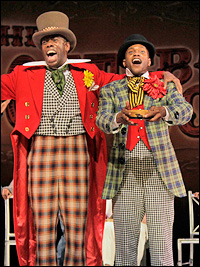
*
According to librettist David Thompson, it was the late lyricist Fred Ebb who came up with the notion of using a minstrel show format in their new musical The Scottsboro Boys, which opens Oct. 31 at Broadway's Lyceum Theatre.
If Ebb, who died in 2004, thought he was going to catch his longtime writing partner John Kander blinking by bringing up the long-discarded and racist tradition, he was mistaken.
"I had actually directed minstrel shows at a boys' camp in the 1930s," says the mild-mannered, 83-year-old Kander. Sitting in his Upper West Side townhouse study, surrounded by framed posters of his and Ebb's many famous shows (Cabaret, Chicago, etc.), the composer's admission momentarily silences his interviewer.
"I was a camper and then a counselor at this wonderful place," he recalls of the northern Wisconsin summer camp he attended. Two shows were staged every season: "a camper show and a counselor show, and the counselor show was a minstrel show," with the camp counselors made up in blackface. The Scottsboro Boys, directed by five-time Tony winner Susan Stroman, dramatizes the real-life events surrounding nine black teenagers who, in Jim Crow–era Alabama, were unjustly accused of raping two white women. In the musical, the nine are gathered and directed by a character called the Interlocutor (the only white person in this production) and his buffoonish "end men," Mr. Bones and Mr. Tambo. These stock figures are in keeping with the minstrel tradition, which began in the 1840s. A collection of sentimental songs, dances and sketches meant to be a depiction of black life in the South, the minstrel show was performed by whites in blackface. After the Civil War, minstrel shows remained popular and began to be performed by black people.
| |
 |
|
| Colman Domingo as Mr. Bones and Forrest McClendon as Mr. Tambo | ||
| photo by Paul Kolnik |
Kander is not the only one drawing on personal experience to re-create a shameful chapter in American culture, he says. Actor John Cullum, who plays the Interlocutor, also found inspiration close to home. "It's fascinating, his performance," Kander says. "He's playing his father. He and I are the same age. He grew up with that. He's playing the kind of genteel white man who would not go out and beat his slaves but would take a paternalistic attitude. He nailed it."
Kander adds Scottsboro to Cabaret on the list of his and Ebb's most overtly political musicals. But, he says, "we never set out to be political writers. It kind of turned out that way. We ended up dealing with political and social issues, international or otherwise. It wasn't as if Fred and I were aware of it. We were always attracted by an atmosphere and a story."
Scottsboro is the second Kander and Ebb show to reach Broadway since Ebb's passing, the first being Curtains. "I'm very excited about it coming to Broadway," says Kander. "The experience we had at Vineyard [Theatre, where the show debuted last season] was...the most fulfilling experience any of us had ever had. I don't know if I can tell you exactly why.... Partly because we were dealing with a very real, terrible injustice that had been swept away and was practically in nobody's consciousness. The cast took the piece and ran with it. It became their mission."
*
Click below to listen to samples from the Off-Broadway cast album of The Scottsboro Boys, used with permission from JAY Productions Ltd. (© 2010 JAY Productions Ltd. / ℗ 2010 JAY Productions Ltd.):
Hey, Hey, Hey, Hey
Commencing in Chattanooga
Alabama Ladies
Go Back Home











